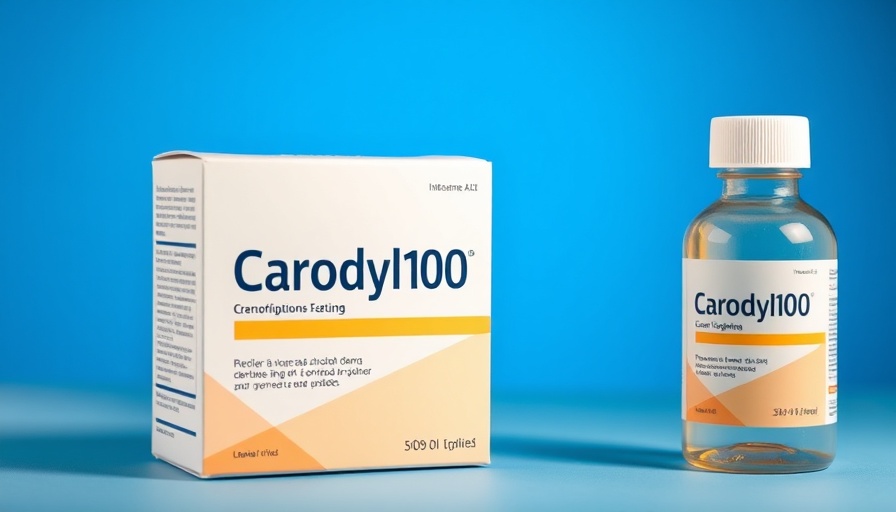
What Pet Owners Need to Know About Carodyl-100 for Pets
As pet owners, ensuring our companions live healthy, pain-free lives is paramount. Carodyl-100 has emerged as a pivotal medication in managing pain and inflammation in dogs, commonly prescribed for various conditions, including arthritis and post-operative care. Understanding what Carodyl-100 is, how it works, and its benefits is essential for any pet lover.
So, What Is Carodyl-100?
Carodyl-100 is a non-steroidal anti-inflammatory drug (NSAID) specifically designed for dogs. This medication contains Carprofen as its active ingredient, which alleviates pain and inflammation, making it particularly useful for treating musculoskeletal disorders and post-surgical discomfort. It’s crucial for pet owners to recognize its importance—Carodyl-100 is not just about managing your dog's pain; it significantly improves their quality of life, allowing them to be active and happy.
Key Ingredients That Make a Difference
Each Carodyl-100 tablet features 100 mg of Carprofen among other inactive ingredients designed to aid digestion and absorption. The combination ensures efficacy while minimizing side effects, allowing the drug to be gentle on a dog's digestive system.
Why Opt for Carodyl-100 Over Other Medications?
Unlike some human medications, which might be dangerous for dogs (like ibuprofen), Carodyl-100 is tailored to meet a dog’s needs without adverse effects when properly prescribed. Veterinarians across the globe often recommend it because of its targeted anti-inflammatory properties. In particular, Carprofen acts as a selective COX-2 inhibitor, effectively suppressing inflammation while protecting the gastrointestinal tract.
Understanding the Usage of Carodyl-100
Carodyl-100 is primarily used for managing several conditions:
- Relief from postoperative pain
- Management of chronic conditions like arthritis
- Addressing injuries and other musculoskeletal issues
As a pet owner, it’s essential to adhere to your veterinarian’s dosage instructions, typically 2 mg per pound of body weight per day, divided into two doses. Always consult your vet before starting any new medication and monitor your pet closely for any side effects.
Potential Side Effects and Monitoring
Although Carodyl-100 is generally safe, some dogs may experience mild to moderate side effects. Common issues can include:
- Gastrointestinal disturbances such as vomiting and diarrhea
- Loss of appetite
- Rarely, liver and kidney complications leading to serious health issues
Regular veterinary check-ups, including blood tests, are crucial for those on long-term medication to ensure liver and kidney functions remain stable.
Important Considerations for Pet Owners
Before administering Carodyl-100, it’s imperative to consult a veterinarian, particularly if your dog has underlying health conditions or is taking other medications. Never combine Carodyl-100 with other NSAIDs, as this can elevate the risk of severe side effects. Additionally, ensure the medication is stored safely away from your pet to prevent accidental ingestion. It’s a good practice to keep your vet informed about any changes in your pet's condition or behavior while they’re on this medication.
Creating a Positive Experience with Medication
Making medication time pleasant for your pet can ease the process. Use treats or a pill pocket to mask the taste of the tablet, and ensure you provide plenty of fresh water afterward. Maintaining a positive experience can alleviate stress for both you and your pet and establish a routine that is healthy and manageable.
The Bottom Line: Empowering Pet Owners
The responsibility of caring for a pet extends beyond food and playtime—it includes being well-informed about their health and wellbeing. Carodyl-100 serves as a significant tool for owners to manage their dog's pain effectively. Prioritize communication with your vet and be proactive in understanding potential risks and benefits to keep your beloved pet thriving.
For pet owners and healthcare professionals alike, the information regarding Carodyl-100 is not just educational—it's vital for enhancing the lives of animals and enriching the bond shared with them. Stay informed about your pet's health and reach out to your vet if you have concerns regarding their medication.
Call to Action: To learn more about caring for your pet and understanding their health needs better, engage with your local veterinarian today. Your pet deserves the best!
 Add Row
Add Row  Add
Add 


Write A Comment